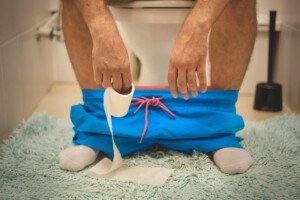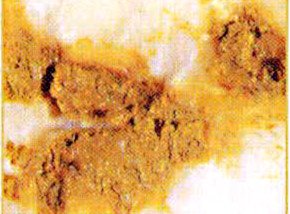
Removal of the gallbladder can cause diarrhea, for sure — and it may take a long time to go away.
Following gallbladder removal, the diarrhea that may occur can take weeks to months to go away, says Akram Alashari, MD, a trauma surgeon at Geisinger Medical Center in PA, and author of “THE POWER OF PEAK STATE.”
“Diarrhea following cholecystectomy has been reported in 5 to 12 percent of patients,” he says.
The diarrhea will “resolve or significantly improve over the course of weeks to months.”
What causes diarrhea after gallbladder removal?
Dr. Alashari explains, “The diarrhea is related to excessive bile acids entering the colon.
“In the absence of a gallbladder, bile drains directly and more continuously into the small bowel, which may overcome the terminal ileum’s reabsorptive capacity.
“The increased bile acids in the colon lead to diarrhea (cholerheic diarrhea).
Treatment for diarrhea following gallbladder removal?
“Patients often respond to treatment with bile-acid binding resins such as cholestyramine,: says Dr. Alashari.
“Cholestyramine doses of up to 4 g daily have been suggested for the treatment of chronic diarrhea, though it is reasonable to start patients on a lower dose (e.g., 2 g once or twice daily) and titrate to a higher dose as needed.”
What You Should Know About Gallstone Pain
Gallstones can be the size of a tiny grain of sand to that of a golf ball. You can have one “stone” or several at the same time.
The pain isn’t always on one’s upper right abdomen. It can also occur in the upper central part of the abdomen.
It may also be between the shoulder blades or in the right shoulder.
The duration of the pain may be several minutes to a few hours.
Risk Factors for Gallstones
- Being a woman
- Over age 40
- Obesity, even moderate overweight
- Rapid weight loss
- Sedentary lifestyle
- Pregnancy
- Diet high in fats and “bad” cholesterol
- Diet that is low in fiber
- Diabetes
- Liver disease
- Oral birth control
- Hormone replacement therapy
- Family history of gallstones
Some of these risk factors are dictated by choice.
You can get to work at making the lifestyle changes that will lower your risk of ever having to have your gallbladder removed — and suffering the possible subsequent diarrhea.

Dr. Alashari was formerly with Grand Strand Regional Medical Center in SC as an abdominal and critical care surgeon.
 Lorra Garrick has been covering medical, fitness and cybersecurity topics for many years, having written thousands of articles for print magazines and websites, including as a ghostwriter. She’s also a former ACE-certified personal trainer.
Lorra Garrick has been covering medical, fitness and cybersecurity topics for many years, having written thousands of articles for print magazines and websites, including as a ghostwriter. She’s also a former ACE-certified personal trainer.
.


























